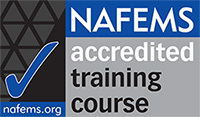
Essential Principles of Simulation Data Management
| Duration: | 2 days |
| Delivery: | Onsite Classroom
Public Classroom |
| Language: | English
French |
| Level: | Mid-level |
| Availability: | Worldwide |
| Tutor(s): | Mark Norris |
| Request Full Details |
Get a head-start on your SDM solution.
Engineers and engineering departments are facing a rapid and continuous increase in the size and complexity of the data sets they need to manage. Simulation Data Management (SDM) solutions have now been in effective, productive use for eighteen years. SDM solutions have both enabled organisations to get their data under control and to achieve significant reductions in time spent on laborious data management tasks. SDM has enabled breakthrough increases in engineering throughput through productivity increases, global working, and democratisation of simulation processes and accelerated analyst development. But there have been notable, expensive, SDM project failures which could now be avoided by following the methodology described in this course.
The course will provide delegates with an understanding of the technology of Simulation Data Management Solutions and of the benefits achieved through the deployment of SDM by reference to case studies taken from the experience of early adopters of this breakthrough technology. It also catalogs the potential benefits achievable from an SDM solution to help delegates identify suitable opportunities to deploy SDM in their organisation and to justify such a project.
The course identifies the key success factors and risks specific to SDM solutions, notably selecting a fit-for-purpose solution, identifying & closing gaps in capability, ensuring adoption by analysts and alignment with overall IT strategies. .
Course Program
- Introduction to SDM
- The NAFEMS SDM Working Group
- Business & operational challenges
- Why is it hard to manage simulation data?
- How can SDM help?
- Where does Democratisation fit?
- Key Challenges & Risks of an SDM Project – before it starts
- SDM Fundamentals – System Level Requirements
- The 7 Core Capabilities of an SDM Solution
- Early Adopter Case Studies and lessons learnt
- Requirements to replace the File system, Content Management
- Technologies for SDM Solutions: SDM, xDM, Standards-Based, CAE, PDM
- Current COTS Solution Strategies
- How does SDM fit with PLM & PDM
- 4 Generations of SDM solutions with case studies
- Latest Technology Trends
- Standards in SDM
- Engineering Improvement through Managed Simulation – presentation
- Business Value from SDM
- Operational Business Value from SDM
- Justifying an SDM deployment
- Developing an SDM strategy
- An SDM Proof Of Concept
- The SDM Project Plan
- Data lifecycle management
- SPDM in an overall PLM landscape
- Conclusion



